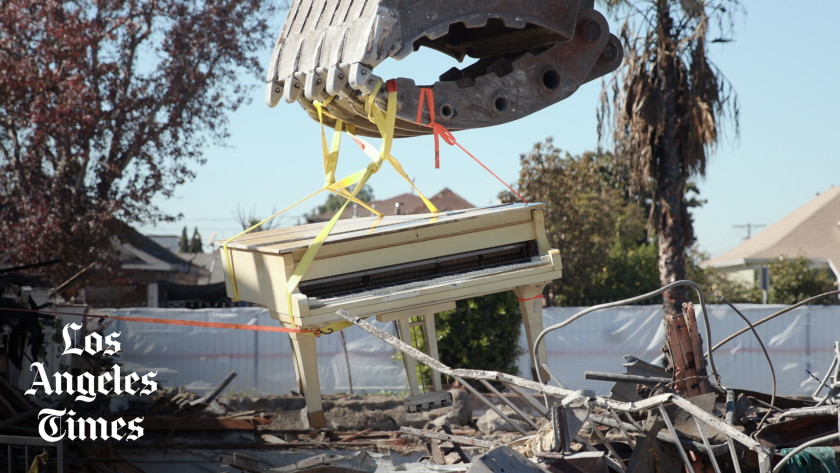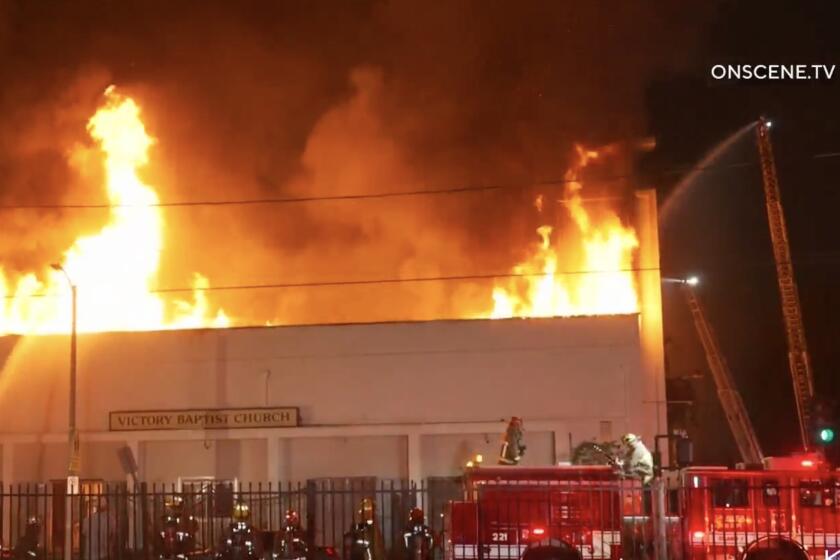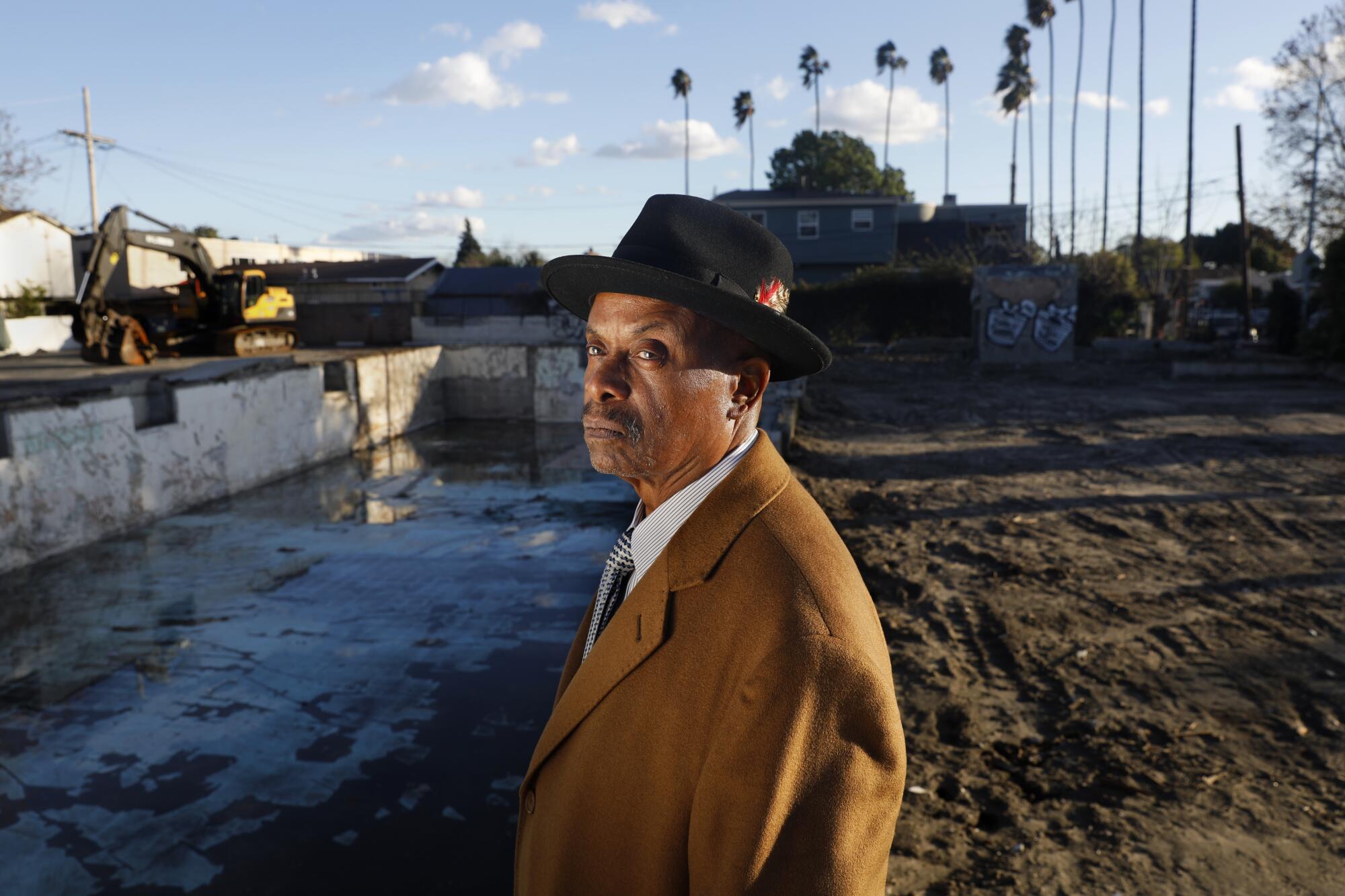
- Share via
Pastor Edward Jenkins startled awake.
“Edward, get up!” said Kimberley. “Get up. The church is on fire.”
Jenkins struggled to understand. He looked at the clock — 2:30 a.m. — hours before he’d be delivering his Sunday sermon.
“The church is on fire,” his wife repeated. “We have to go.”
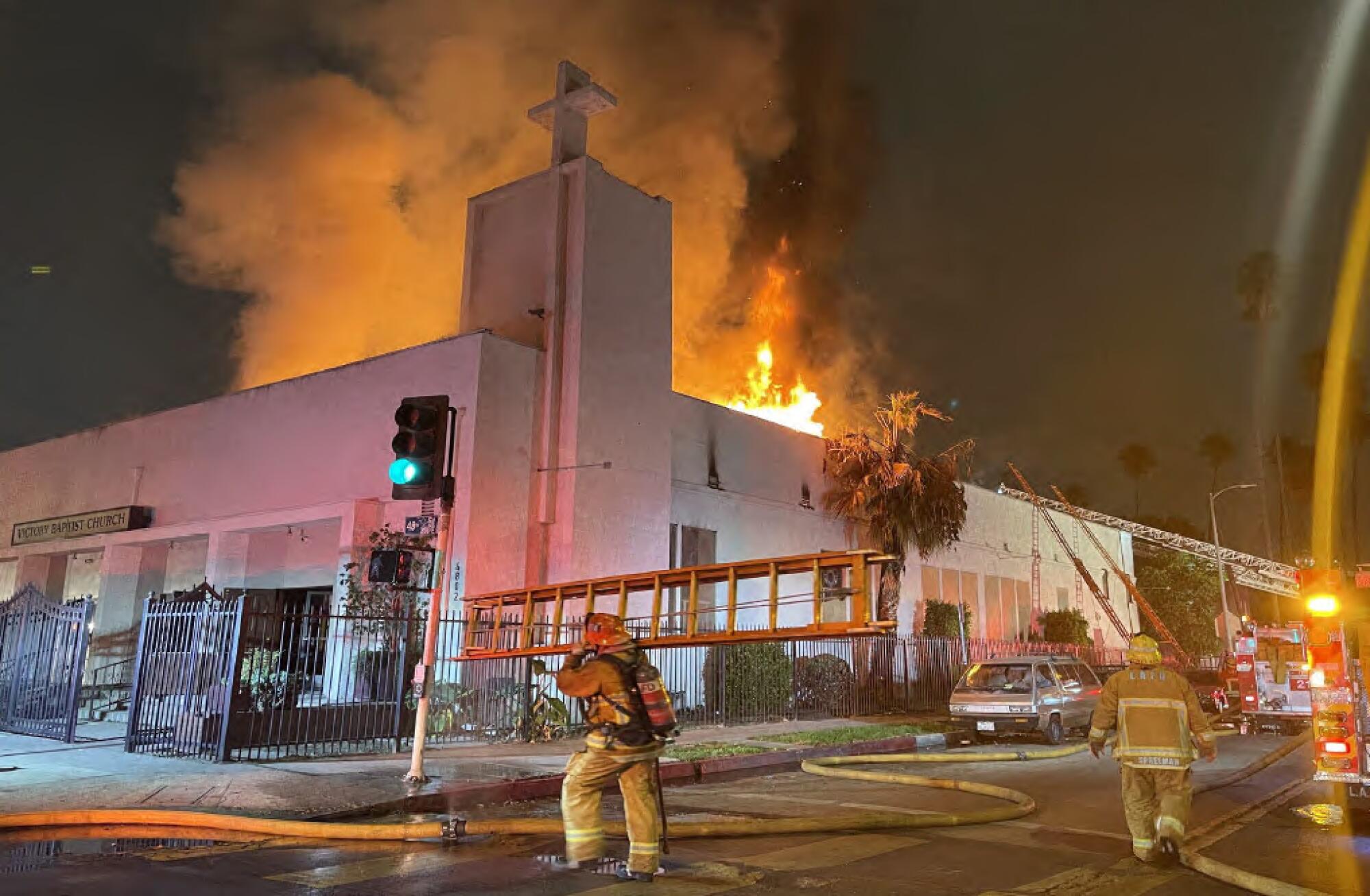
Jenkins reached for his glasses. He read the texts on his phone. There was no time for thinking, for considering what would be lost if their church burned down.
Founded in 1943 and named for the nation’s hope in a time of war, Victory Baptist Church was the spiritual home for four generations of Black Angelenos, many of whom arrived in Los Angeles during the Second Great Migration from the segregated South.
It was here where the Rev. Martin Luther King Jr. delivered calls for equality and justice, where Mahalia Jackson sang of the world’s troubles, where Billy Preston learned the language of the organ.
It was here where mayors, City Council members and community activists counseled, advised, cajoled and roused members to action.
It was here where any talk of loss would be too great to contemplate.
The night — Sept. 11, 2022 — was warm and clear. The couple drove west from their home in La Habra, a route they had followed for 27 years.
- Share via
Months after a fire destroyed Victory Baptist Church in South Los Angeles, its pastor wrestles with what it means to be a Black church in a Latino area of Los Angeles today.
As the downtown skyline came into view, they took Central Avenue south, turned right at 48th Street and stopped. Fire engines and police cars blocked the way; emergency strobes painted the neighborhood red, then white.
Jenkins and Kimberley parked and walked. They breathed the acrid air, stepped over fire hoses snaking across the road where pools of water had collected. Whatever hope they had held onto disappeared.
Soon joined by their son, Jahi, Jenkins watched as the flames leaped above the roof, lighting the tower and white cross, turning gray smoke orange. Ladder trucks trained broad streams of water into the hollowing shell.
By dawn, members of the church showed up, and Jenkins, 70, knew he needed to be a voice of hope and reason. If he had any doubts, he hid them. A fire like this could be the end of a church whose congregation was already in decline.
“We shall rise from the ashes,” he said. “We shall return.”
But he saw in their eyes confusion and disbelief. How could this have happened? they asked.
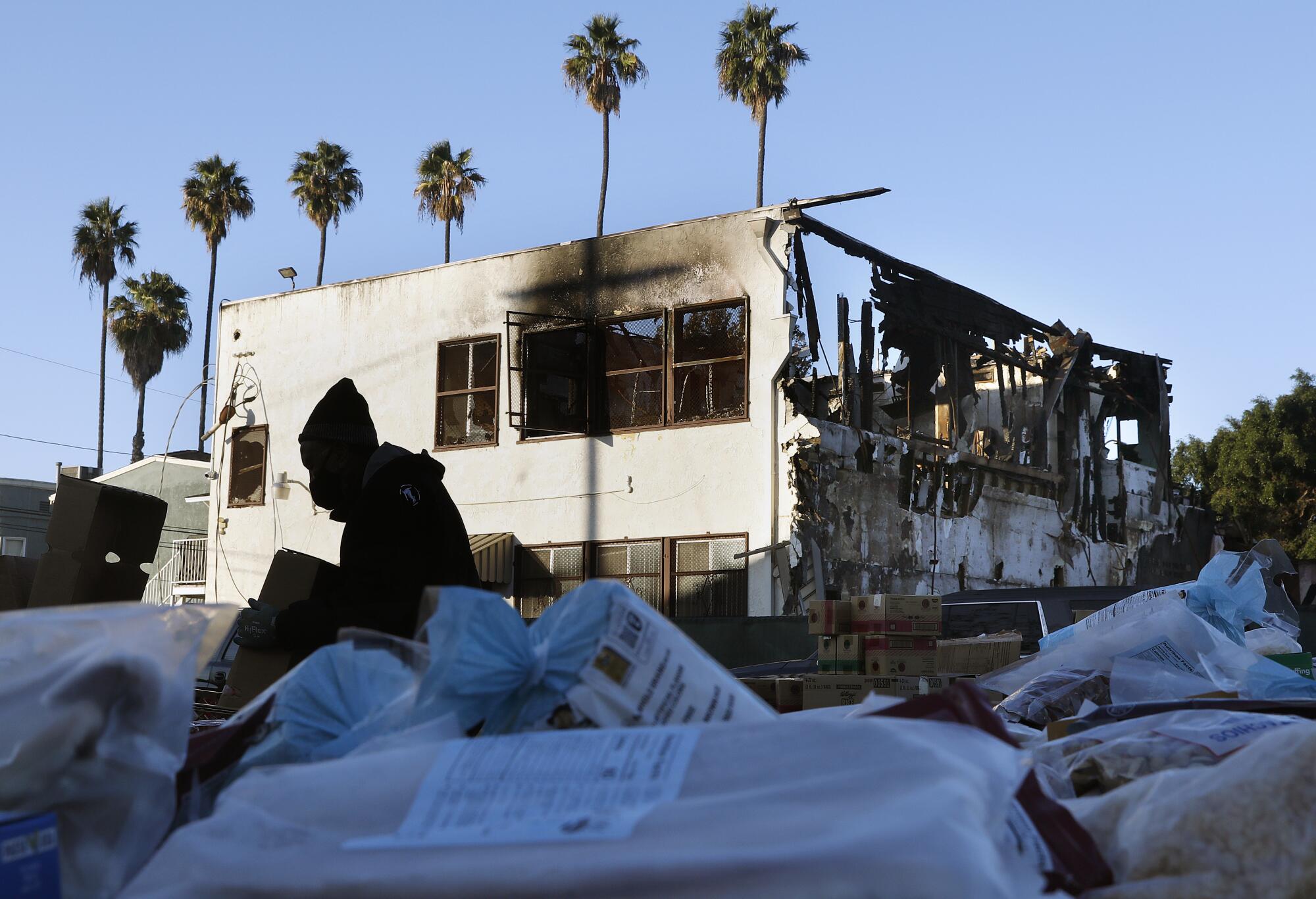
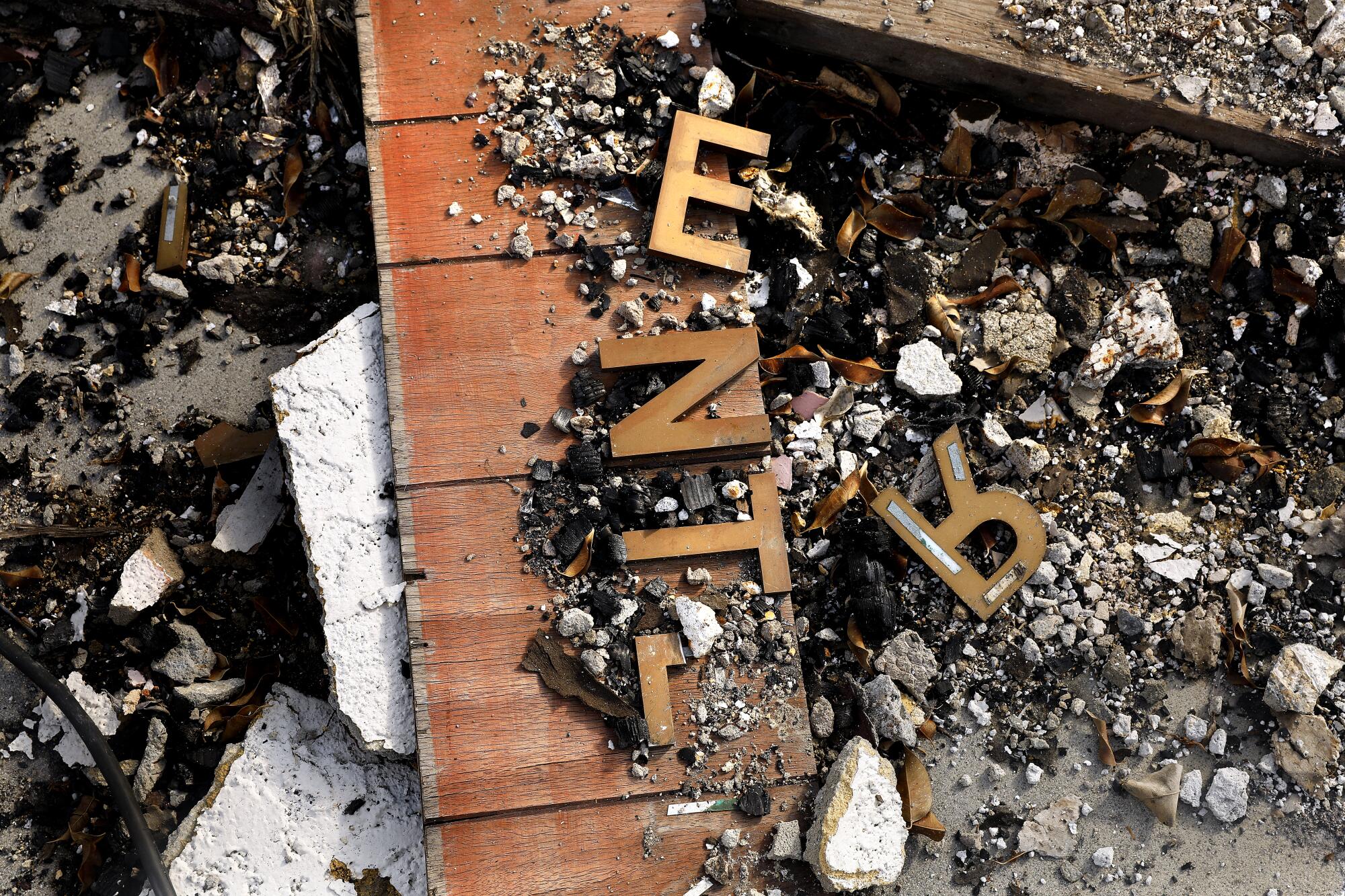
He had his suspicions. A few days earlier, he had watched a video from the church’s surveillance camera, time-stamped the Sunday before.
A man with a backpack walked down the sidewalk. He climbed the iron fence that surrounded the property. For a few seconds the image froze, and when the video picked up again, the man was gone, but the fronds of a palm tree growing near the building flickered in the light of a fire.
That man, Jenkins feared, must have returned to finish the job.
Amid the small and tidy bungalows, lemon trees and overgrown yards of South Park, just west of Central and south of Vernon avenues, Victory Baptist Church was a comforting presence for most residents, even if they never attended services.
With its white stucco facade three steps up from the sidewalk behind a scalloped iron fence, the building was a mystery, so plain and austere. But Jenkins knew differently.
He saw instead the dusky-blue morning light streaming through the stained glass windows, the glass chandeliers, the white pews in a sea of blue carpet, red carpet encircling the pulpit and choir loft.
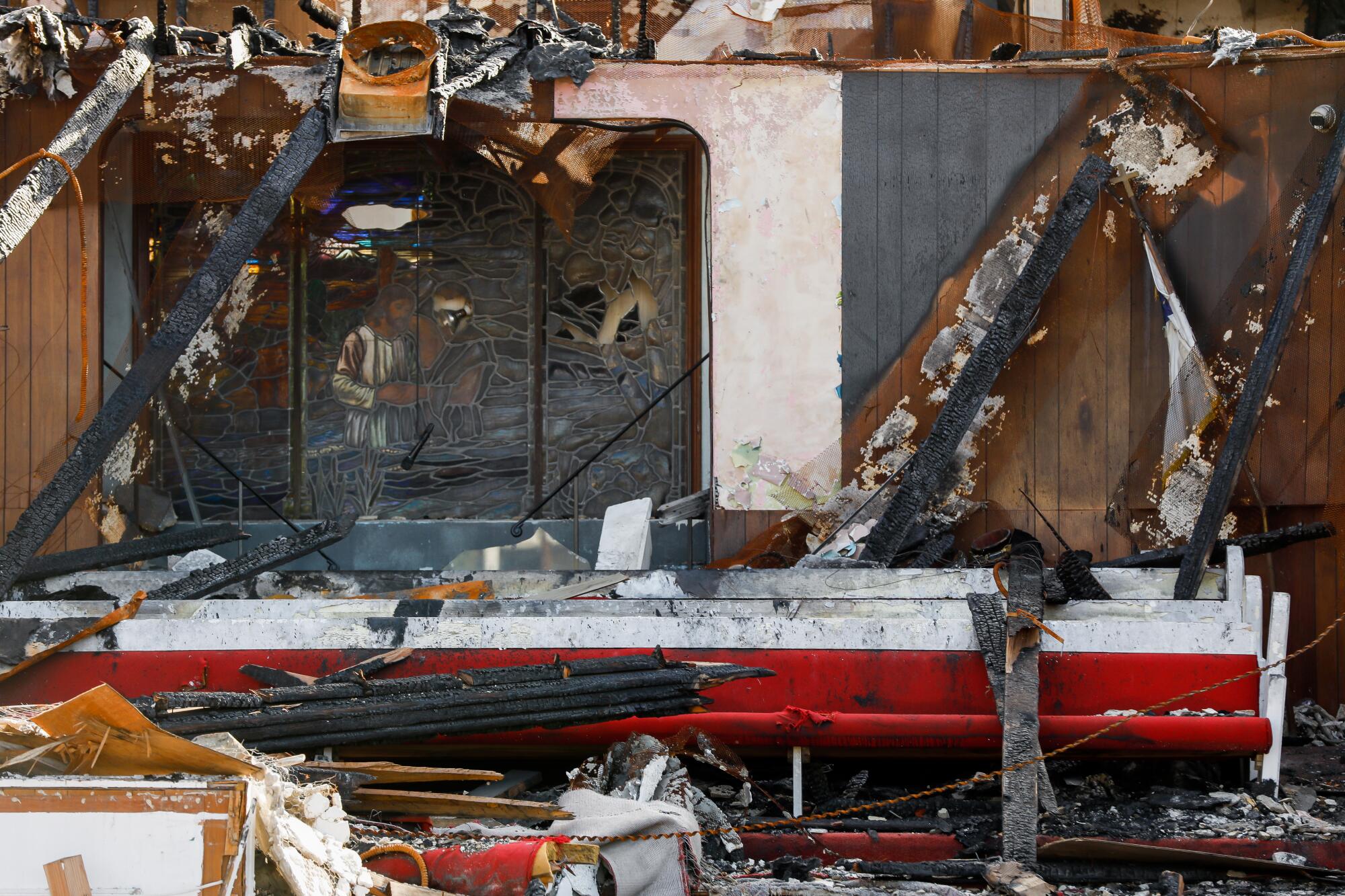
He heard the hopes, dreams, laughter and tears of a congregation strengthened by community, animated by song and inspired by the Lord to fulfill life’s most urgent calling, emblazoned in gold letters on the wood paneling in front:
TO SERVE THE PRESENT AGE
Jenkins could never escape the responsibility of those words. In sermons, he called out the hypocrisies of the faithful, who didn’t understand that overturning Roe vs. Wade placed a burden on women of color, or that the so-called prosperity gospel enriched the few at the hands of the many.
But since the fire — and his suspicions — he finds himself wondering what the present age actually wants.
“We must continue to be a servant on this block, in the hope that it will serve the future.”
— Pastor Edward Jenkins, Victory Baptist Church
Decades ago the answer might have been easier for a Black church in a Black neighborhood. But the neighborhood today is mostly Latino. Its residents, drawn by familial bonds to more evangelical ministries, would probably never worship in his sanctuary.
America, Jenkins knew, is as segregated on Sunday mornings as the Rev. King had said, and for Victory Baptist Church, an island in the middle of a changing city, bridging these divisions is critical to its future, especially as it considers rebuilding.
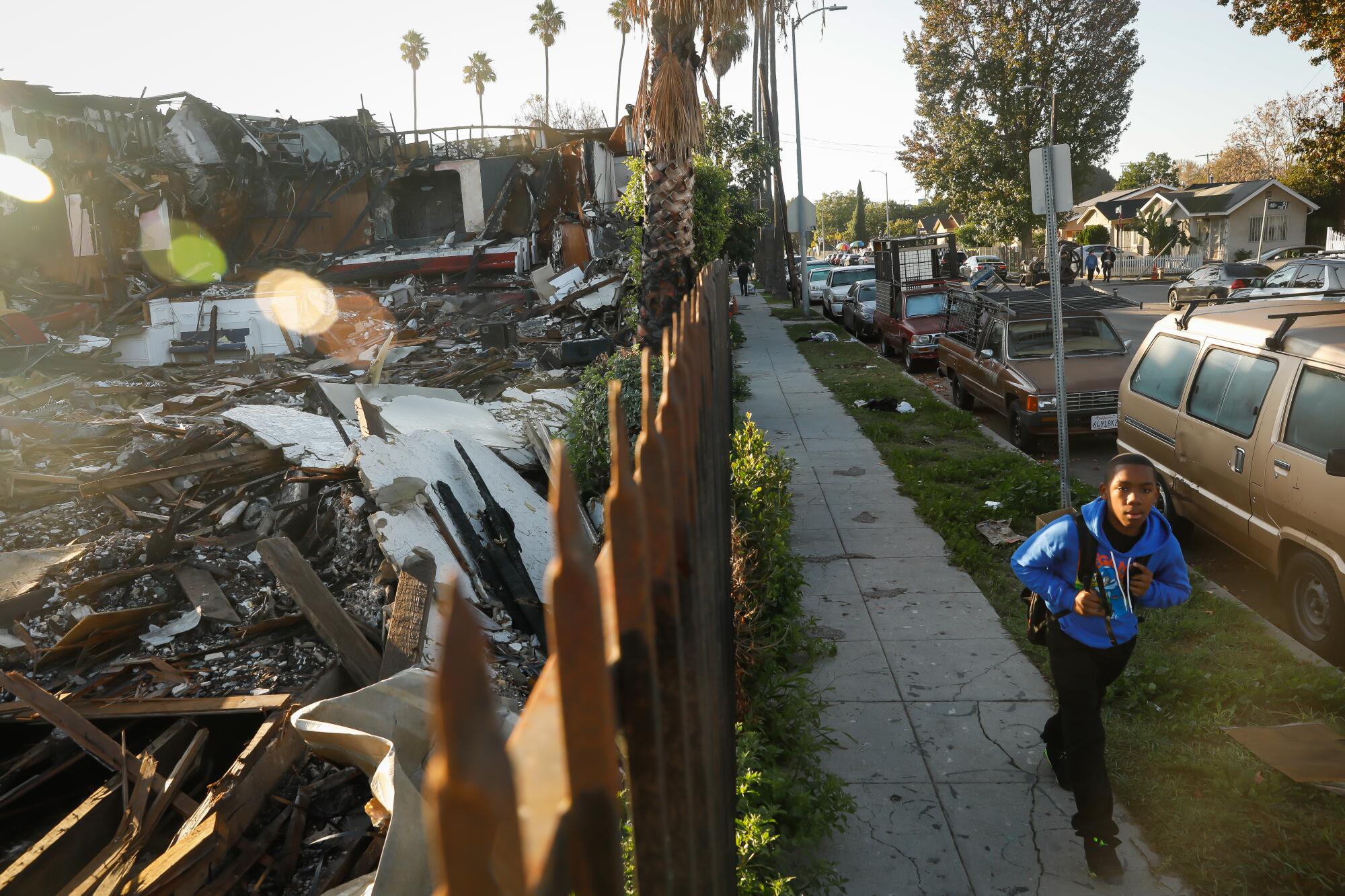
Some have argued that churches like his are fighting time and demographics, that changes in historically Black neighborhoods threaten Black neighborhood churches, that the megachurches are the future.
But Jenkins questions this.
The pandemic has changed how congregations worship. Some members preferred online services. Others sought smaller groups, and though his congregation may not be large, it still had its spiritual work — worshiping the Lord, spreading the gospel — and its secular calling.
One hundred fifty Los Angeles firefighters responded to the fire at Victory Baptist Church. Two remain off duty because of injuries suffered that night.
Jenkins sees the need in the faces of the women in line at the food giveaway on Fridays. He sees the want among the children during holiday toy drives and the start of summer camp.
“We must continue to be a servant on this block,” he said, and develop a plan for serving the present time “in the hope that it will serve the future.”
One week after the fire, investigators announced the arrest of Carlos Francisco Diaz, a 23-year-old homeless man.
Diaz had been under surveillance since August as a suspect in nine other alleged attempts to burn down three elementary schools in the area, according to police. He was charged with arson and has pleaded not guilty. Officials have not disclosed a possible motive.
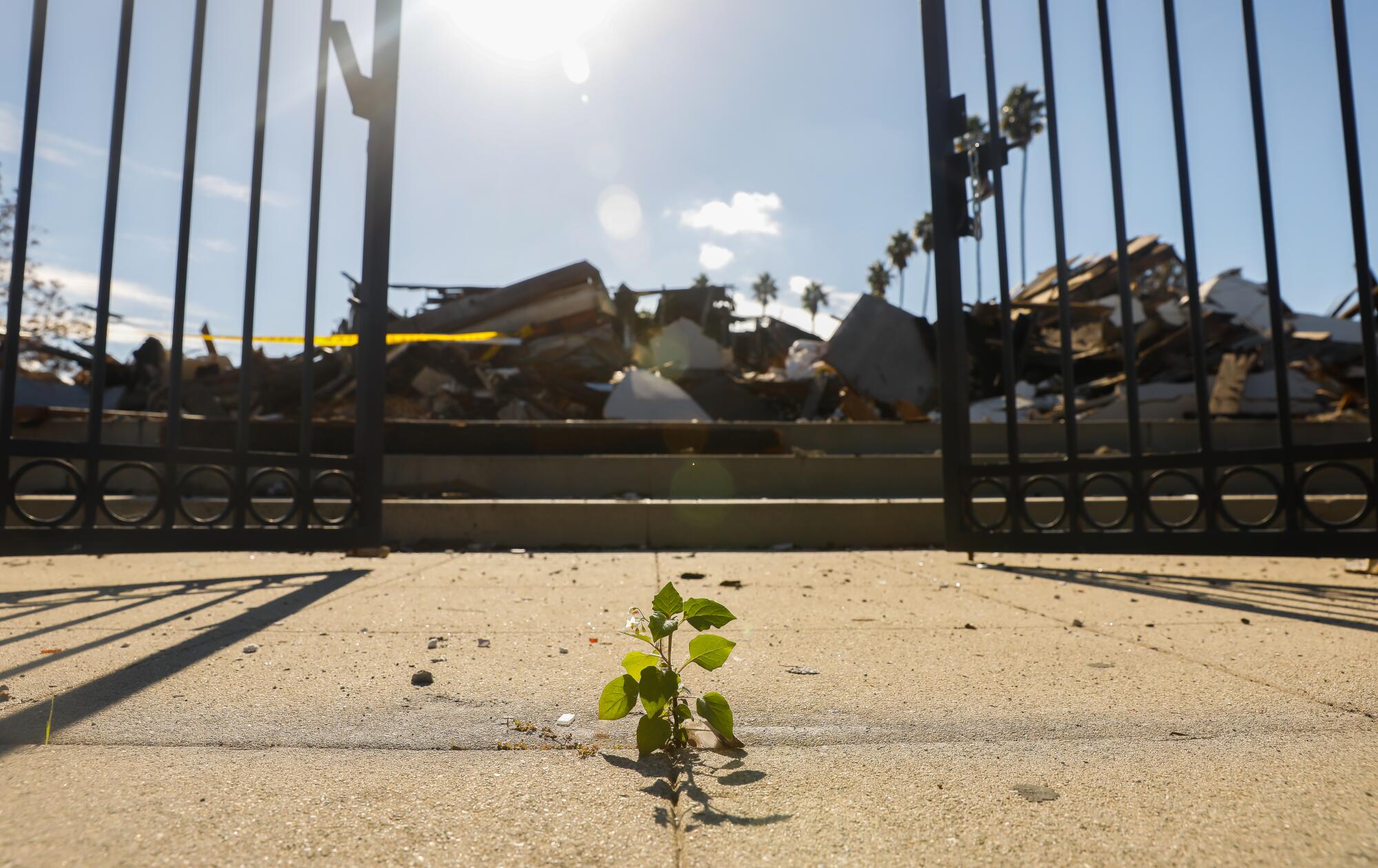
When Jenkins heard the news of the arrest, he was relieved. He could lay aside speculation that negligence — a stove in the kitchen, faulty wiring — caused the fire.
Now, however, he found himself angry.
Diaz had a criminal record. Last year, he was sentenced to jail and probation for battery and vandalism. A third case — possession of meth and drug paraphernalia — is ongoing. Now he’s being charged not just with burning down the church, but with attempting to burn it down a week earlier.
Shouldn’t more have been done to stop him? Jenkins grew quiet.
As much as he preached about the futility of asking why, of looking for an answer for the tragedies of life, he wondered why God had allowed his church to burn down. His faith told him that behind this terrible loss lay some greater truth. He wished he could see it.
He thought about the times he had stood in front of a closed door — a hospital room or a home — uncertain what lay on the other side. He always had to go through. Now was no different.
He remembered the Psalm 27.
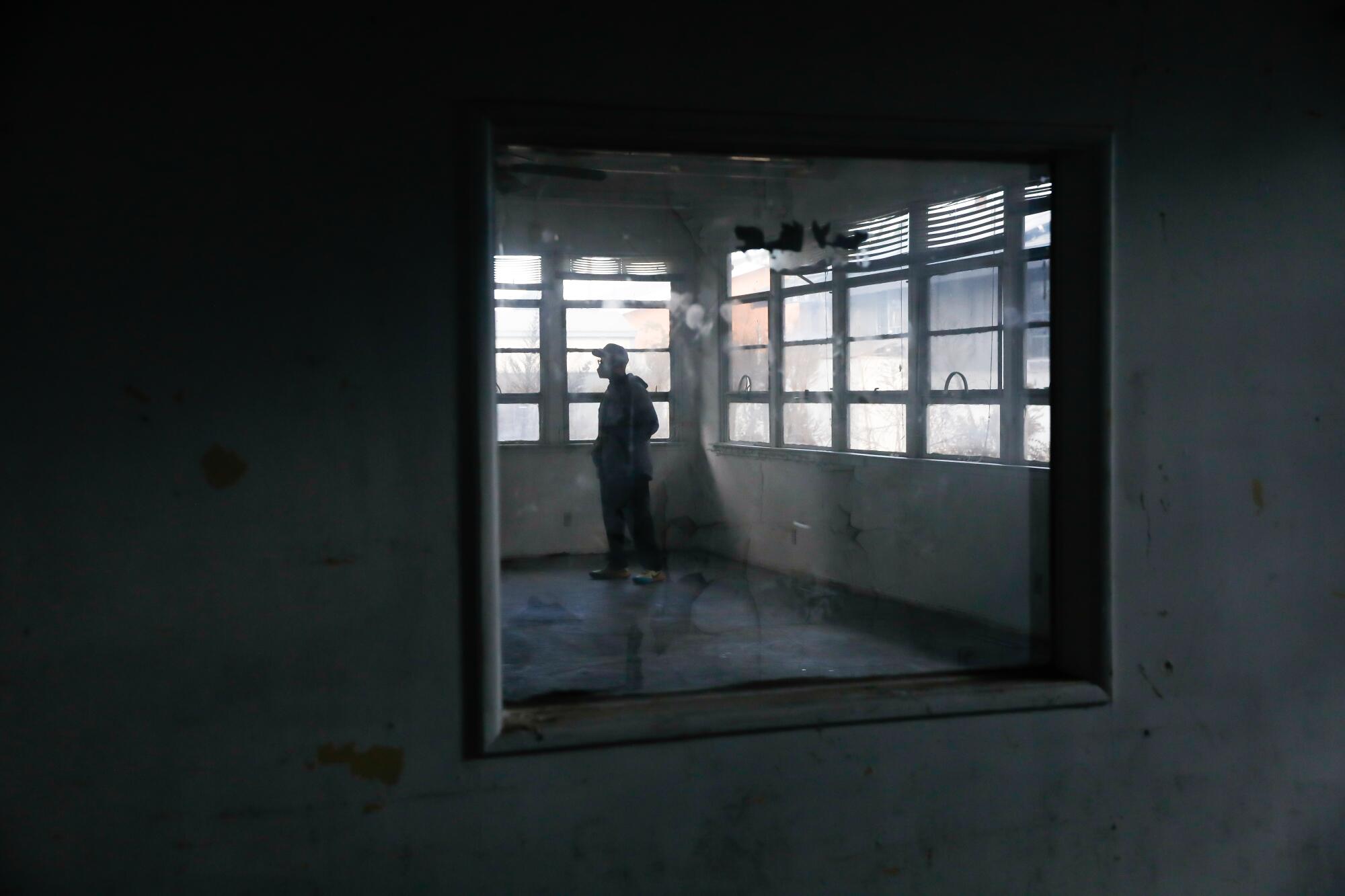
“The Lord is my light and salvation. Whom shall I fear?”
When the secret audio recording of three Latino members of the Los Angeles City Council was reported by The Times one month after the fire, Jenkins didn’t want to believe that their racism might determine the future of the city.
The scenario felt painfully familiar.
In its early years, Victory Baptist Church looked upon a Black working-class neighborhood, whose residents commuted to jobs at General Hospital, the Coca-Cola plant, and Farmer John, yet were constricted by redlining policies and housing covenants that were enforced by the white political power.
Its founder, the Rev. Arthur Atlas Peters, understood these limitations and was intent upon rising above them. He opened a day and nursery school, and produced a weekly television broadcast for the church’s 150-member choir. He held voter registration drives and fundraisers to support the civil rights movement.
After the 1963 church bombing by white supremacists in Alabama that killed four young girls, Peters invited King to preach at the church. King returned in 1965, a week after the assassination of Malcolm X.
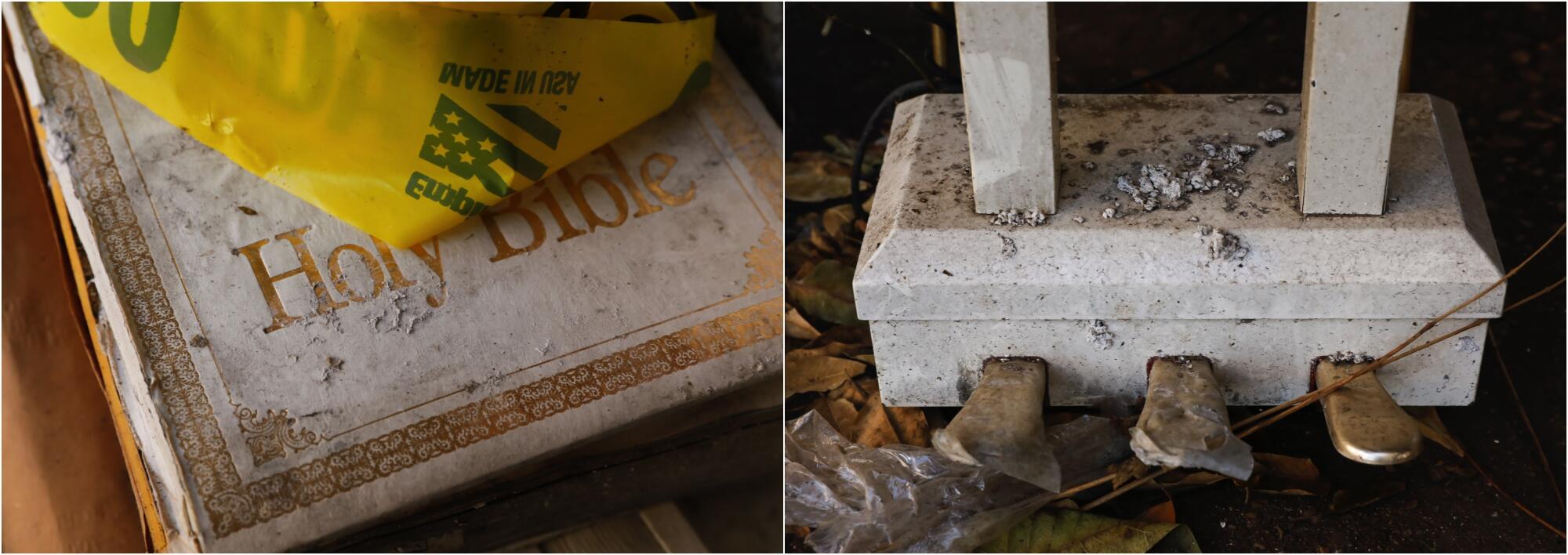
The Watts riots of 1965 were a turning point. With Black neighborhoods in South Los Angeles in ruin, Black leaders sought political solutions for the civil rights crisis, calling on neighborhood churches like Victory Baptist for support.
Their activism helped lead to the election of the city’s first African American mayor in 1973. Tom Bradley, a former police officer and City Council member, beat the incumbent, Sam Yorty, in a landslide.
Two years later, though, tragedy fell upon the church when Peters failed to show up for Sunday service. He was discovered unconscious, bludgeoned in his home, and later died. His killer was never found.
“His death was devastating,” said Benecia Toms, a member of the church since 1949. “I have never felt as much loss as I felt at that moment.”
Almost 50 years later, Peters’ death is still being evoked as if it were the start of a curse. In the decades that followed, South Los Angeles fell prey to a crack epidemic, escalating gang violence and the harsh policies of the Los Angeles Police Department.
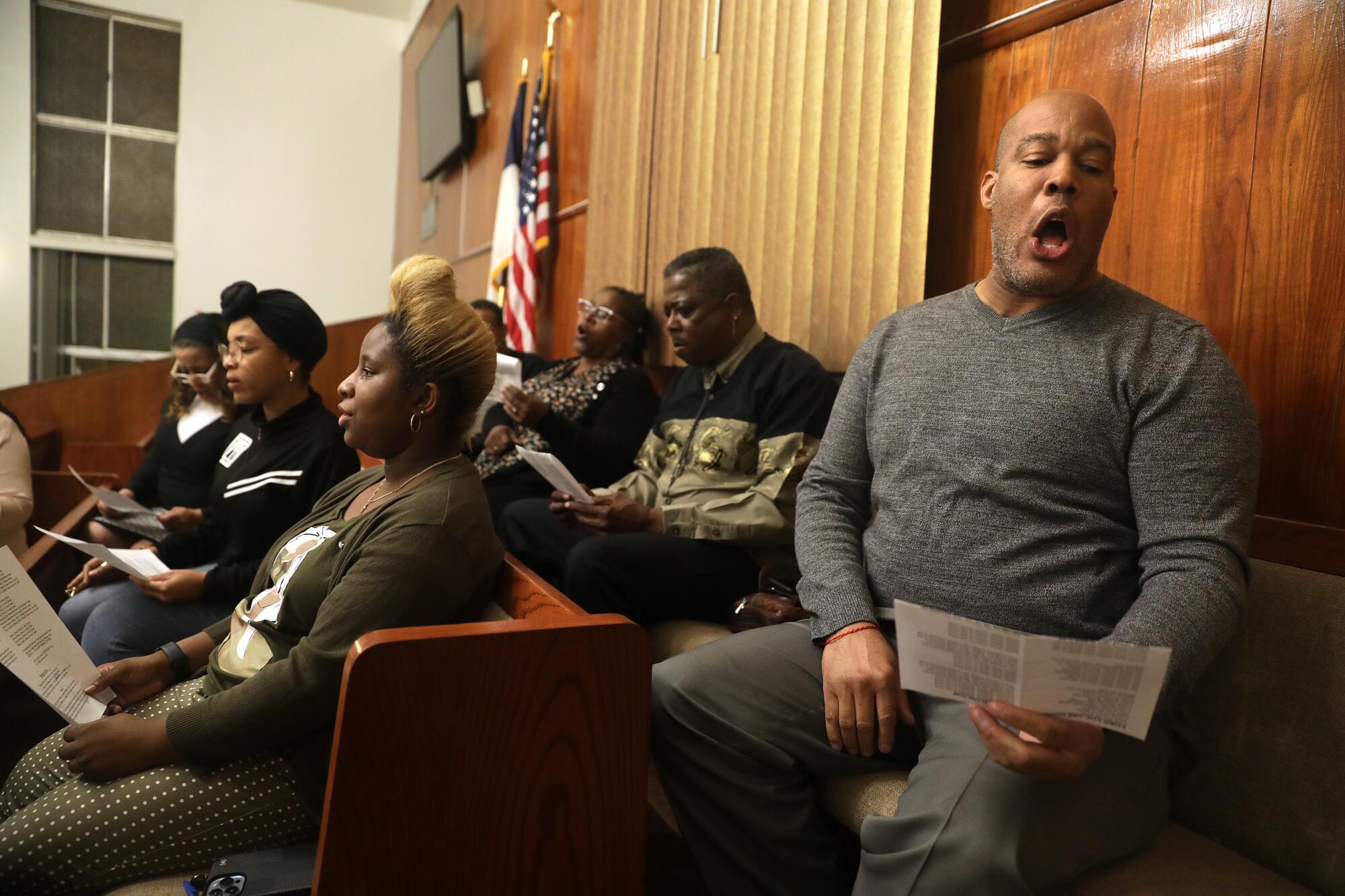
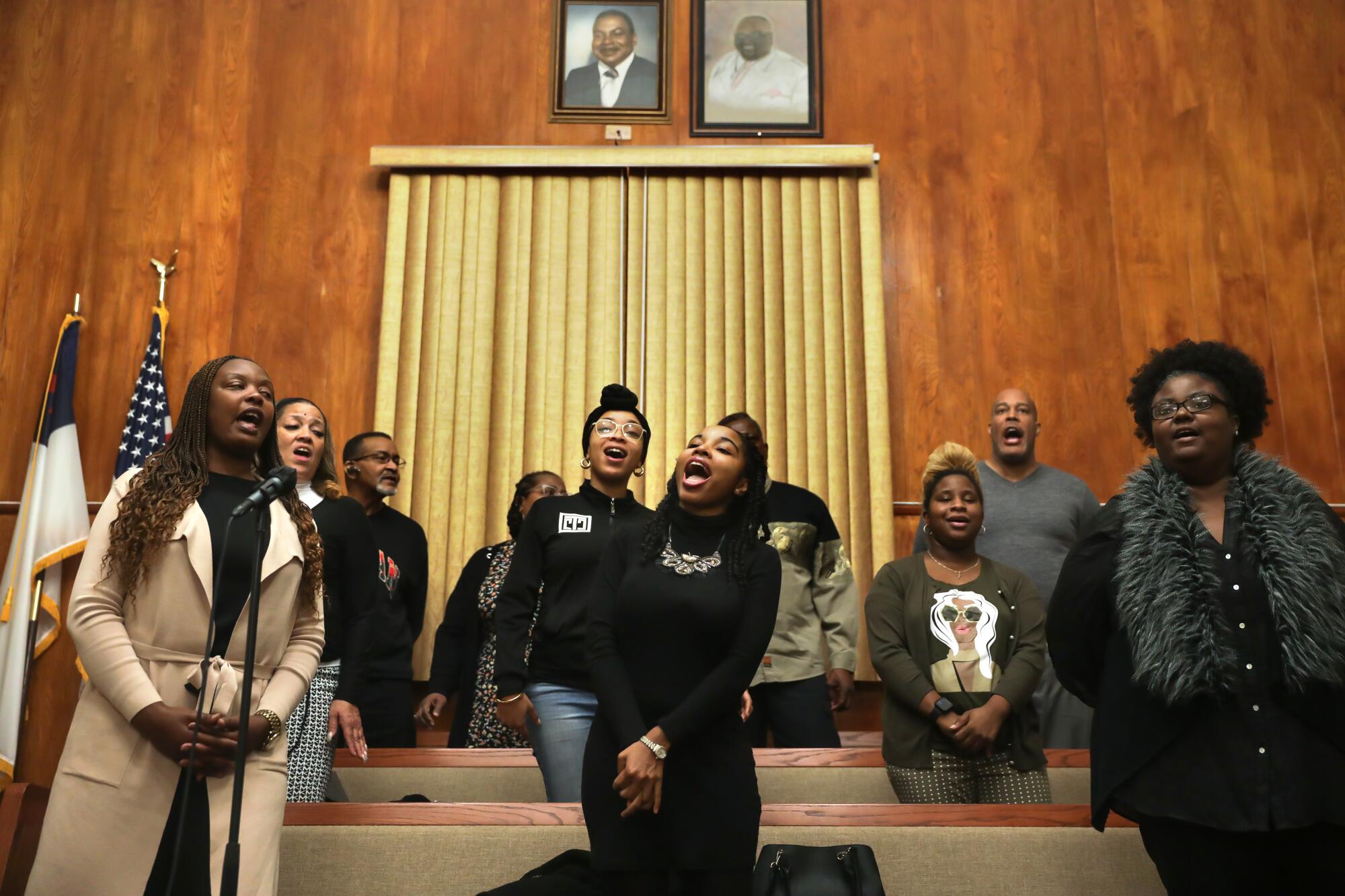
African Americans, worried about their children, began to leave the inner city for outlying suburbs in the Antelope Valley and the Inland Empire. They sold their homes to new arrivals from Mexico and Central America.
The cycle was familiar.
“Whether you’re from Mississippi or Oaxaca, this is where immigrants come because this is the cheapest housing in the city,” said Daniel Walker, curator of the gospel music history archive at USC. “This is where you will congregate to begin your L.A. journey.”
After the fire, Jenkins resolved not to compromise the message or legacy of Victory Baptist Church.
The present age didn’t need churches to drop “Baptist” from their name in an effort to draw more members, as some have done.
He understood the challenge of raising money, but Victory Baptist Church would not become “a GoFundMe church,” he said. “When I came to Victory, it was proud not pompous, proud that we helped others but never took help ourselves.”
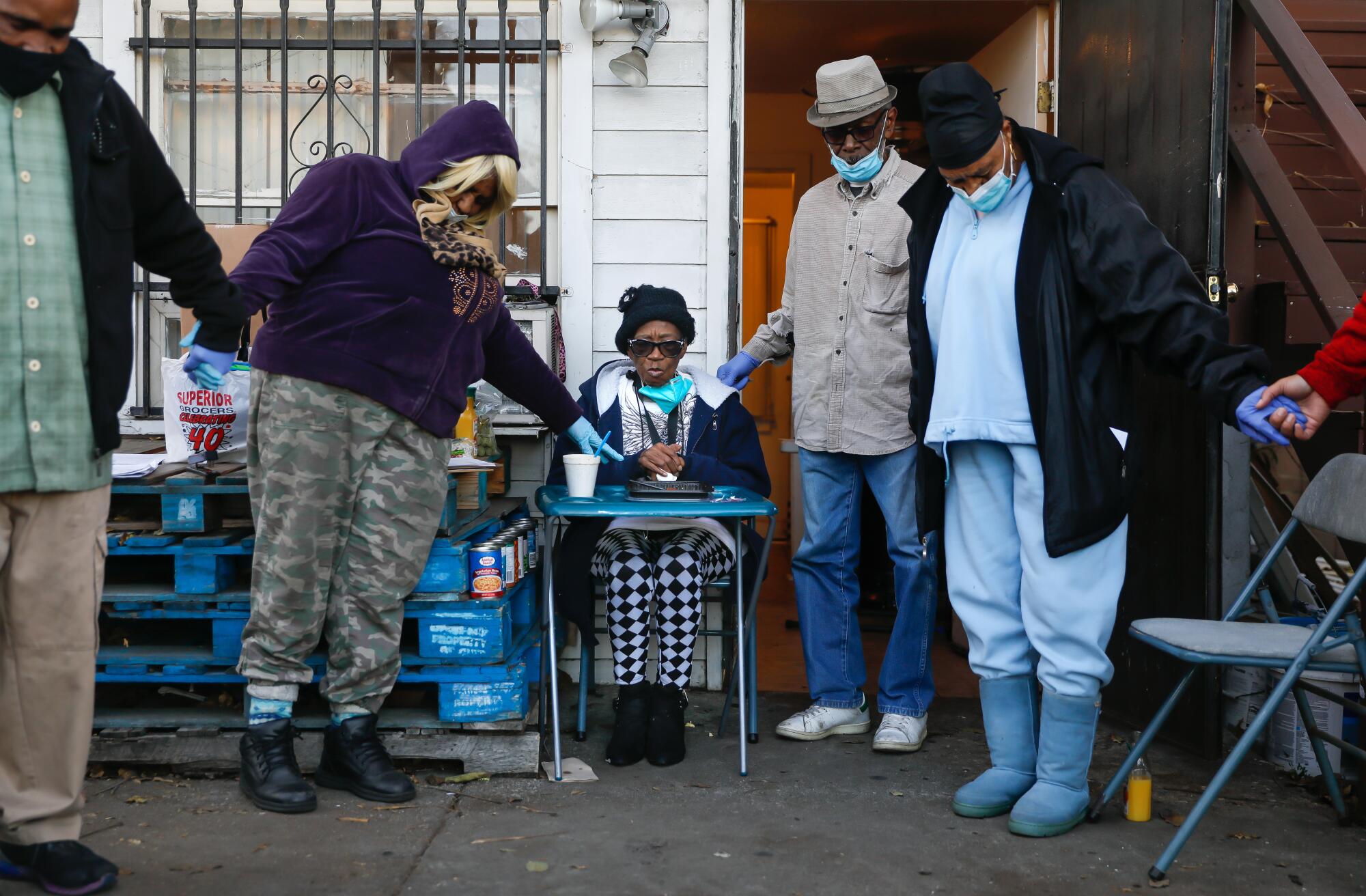
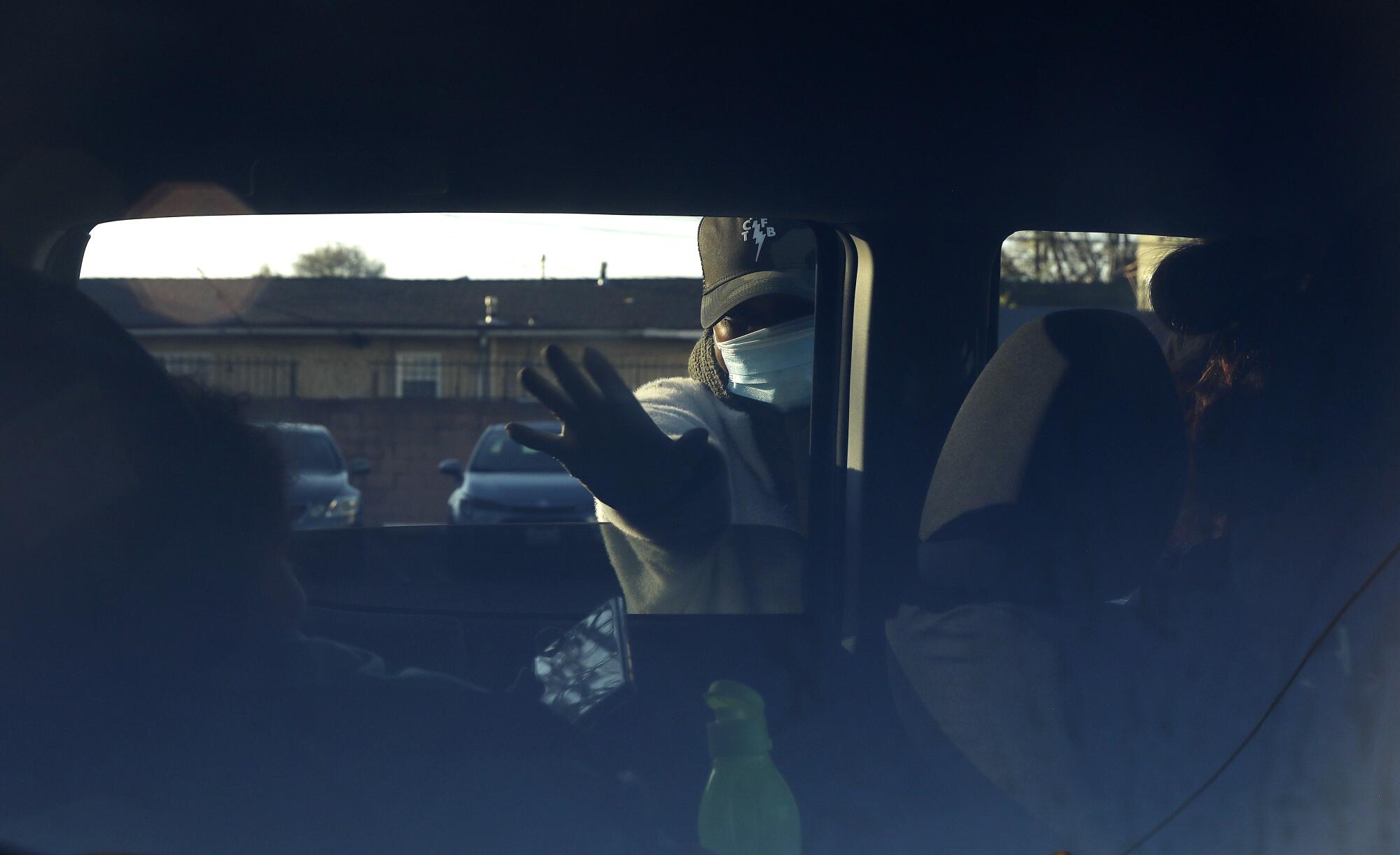
On a cold Friday morning in December, about a dozen members of the congregation arranged tables for the weekly food giveaway in the parking lot beside the darkened ruin of the church.
Roosevelt Hicks, 89, who has been coming to Victory since 1955, was there, as was Johnnie Pearl Knox, 91, who has put in 39 years with the food ministry. They could recall the days when there were three services on Sunday and all the pews were filled, when baptisms outnumbered funerals.
On this day, they helped fill boxes with grapes, walnuts, pinto beans, tomato sauce, potatoes, jelly and rice cakes, provided by the Los Angeles Regional Food Bank.
By 7:30 a.m., cars started to pull up. Mothers with children in the back opened doors, popped trunks and filled out registration forms. Most spoke Spanish, limiting exchanges to pantomimes of gratitude and gracias.
“There are a lot of hungry families out there,” said Joanette Woods, 66, as she thumbed through the forms. By the end, she counted nearly 80 cars and 40 walk-ins, a typical Friday.
Next door, mothers with preschool children were starting their day at the South Central Los Angeles Ministry Project. The nonprofit, known as LAMP, was founded by Catholic nuns and offers classes in early childhood education, parenting and English language skills.
LAMP leases a building and outdoor space from the church, whose foundation sponsors a five-week summer camp for children.
“We’re not a Black or brown community but a community that struggles,” said LAMP’s executive director, Diana Pinto, when describing the challenges of this low-income neighborhood where the lessons of the past are just as relevant today.
In January, young women from LAMP learned King’s “I Have a Dream” speech, which they once recited in the sanctuary of the church where King himself had stood.
After mastering his syntax and language (“... the jangling discords of our nation to a beautiful symphony of brotherhood”), they would sing “We Shall Overcome.”
Nosotros venceremos …
Oh, en mi corazón, yo creo nosotros venceremos.
Whenever Jenkins questions the direction of his life, he relaxes his doubts, knowing that God directs the journey.
A graduate with a doctorate in ministry from the Fuller Theological Seminary in Pasadena, he is now talking with contractors, studying possible designs for the new church and overseeing the renovation of a building down the street that will soon serve as a temporary sanctuary.
Until then, services are pre-recorded and posted on the church’s YouTube channel, a throwback to when the church’s Voices of Victory choir televised their sounds of praise on KTTV.
While Aretha Franklin sung of God’s grace at the New Temple Missionary Baptist Church in 1972, four miles away Victory Baptist Church was making its own joyful noise with Preston, who went on to play with the Beatles, and with gospel superstars like Dorothy Maynor, the Clara Ward Singers and Ethel Waters.
Jenkins, who was a DJ in college (“Soul on Sundays”), and Jahi hold onto that legacy, and on a Wednesday night in mid-January, the church’s Inspirational Choir gathered at the neighboring Greater New Unity Baptist Church.
Its pastor, Randy Allison, was at the piano, Jahi at the organ and the choir was seated in the loft.
After practicing, Jahi turned on the video recorder and returned to the organ where he delivered the broad opening notes. Allison provided the counterpoint, and the singers followed with harmonies rising, each anchored by the refrain.
I’m reaping the harvest God promised me
Take back what the devil stole from me.
Sitting quietly in a pew, Jenkins leaned forward, tapping his Nikes to the melody.
Jahi had selected the song — “Faithful Is Our God” by Hezekiah Walker — because its message: asking the Lord to restore what has been lost.
A 23-year-old law student at USC, Jahi doesn’t plan to follow his father into the ministry, but he understands what’s at stake in rebuilding.
“The Black church has been instrumental in my life,” he said. “It is where I have come to know God and have a relationship with him, learned about my Blackness and the Black community and embrace what it means to be African American.
“That is the historical role of the Black church in the Black community,” he said.
The singers’ voices rose and filled the sanctuary, words and music giving way to the emotional power of the hymn.
Take back what the devil stole from me.
After weeks of rain, on a bright and clear Tuesday morning in February, the excavator arrived. The lumbering machine rolled off a flatbed truck and positioned itself to begin clearing splintered sheets of plywood, charred beams, mangled sheets of metal, twisted girders, chicken wire and slabs of plaster.
Crews, dressed in white hazmat suits and equipped with respirators, began watering down the debris. The site had been screened with opaque plastic sheeting, its perimeter lined with red caution tape.
Less than a week into their work, the baby grand piano in the basement had been uncovered, intact.
Standing on the edge of the pit, the foreman circled his index finger in the air to signal the excavator operator to begin lifting this unlikely survivor of the fire. Jenkins and Jahi watched from a distance.
Dangling from the excavator’s claw, the piano slowly appeared above the wreckage. Painted yellow, it seemed all the more delicate and incongruous amid the heaps of waste and ruin.
Once it was on the ground, members of the crew rolled the instrument toward the pastor and his son. They opened the fall board revealing its black and white keys, flecked with caked ash.
Jahi struck middle C. It didn’t move. Then he tried a chord. Silence.
Between the heat of the fire, water from the hoses and exposure to the elements, the keyboard had swollen and warped, its keys fused together.
Jenkins thanked the crew, and he and Jahi walked away. Having lost so much already, they were hardly fazed.
Victory Baptist will find its future, Jenkins knew. He was merely the shepherd.
More to Read
Sign up for Essential California
The most important California stories and recommendations in your inbox every morning.
You may occasionally receive promotional content from the Los Angeles Times.
